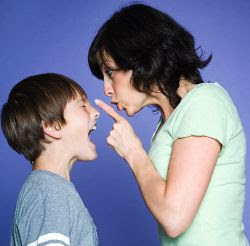ADHD in Children needs to handled with care

ADHD in Children
ADHD is short for Attention Deficit Hyperactivity Disorder. A child with ADHD is impulsive (often acting without thinking), hyperactive (fidgety, walks, runs, climbs, talks over others), and inattentive (daydreams, easily distracted and sidetracked). An ADHD child that is predominantly inattentive with few other symptoms is often referred to as having ADD.
Signs And Symptoms:
ADHD is short for Attention Deficit Hyperactivity Disorder. A child with ADHD is impulsive (often acting without thinking), hyperactive (fidgety, walks, runs, climbs, talks over others), and inattentive (daydreams, easily distracted and sidetracked). An ADHD child that is predominantly inattentive with few other symptoms is often referred to as having ADD.
Causes:
It's believed that this condition affects 3-5% of children and is caused by a genetic defect, rather than poor discipline at home. There really is no evidence either way with respect to the causes. There is evidence that a high carbohydrate diet may be partially to blame.
Treatment:
There are many treatments for ADHD, which usually include various types of behavioral therapy and medications. To give you an idea of the effectiveness of treatment, they're currently conducting studies to determine what the most effective treatment is: behavioral therapy, medication, both, or none. The most common treatment is to put the child on stimulant drugs. Here's a good source of information from the National Institutes of Mental Health NIMH.
Natural Remedies:
· The most successful home remedies include 2 cups of brewed coffee (with caffeine) in the morning and a high protein, low carbohydrate diet. While coffee is an inexpensive and safe alternative to the drugs normally prescribed, always check with the doctor before using any natural remedy.
· Include protein in your child's breakfast and lunch. Several studies suggest that protein is one of the most effective home remedies for ADHD. According to a study at the Massachusetts Institute of Technology, foods containing protein stimulate the brain's production of dopamine, and norepinephrine. These are natural chemicals that help a person stay focused and alert. To get these benefits, most children need between 24 and 30 grams of protein each day. One ounce of cheese, an egg, or a cup of soy milk each contain 7 grams of protein.
· Food sensitivities can increase the behavioral challenges in children with ADHD. Eliminate any foods that cause your child to act out. To find out if your child has sensitivities to certain foods, have your child only eat foods that are not likely to cause them to become hyper. This can include chicken rice, apples, bananas, apples, carrots, and broccoli. Then add a food to your child's diet that you think may be causing their behavioral problems. If their behavior doesn't change in two weeks, try another food, and repeat the process. If your child becomes overly active, you'll know which food they are sensitive to.
· Fish oil has been known to help your child stay focused. Research suggests that polyunsaturated fatty acids can help ease the symptoms of ADHD. As per experts fish oil supplements that contain one gram of omega-3 fatty acids can lead to better behavior in children. It can also improve their ability to focus, which can lead to improvements in spelling and reading.
· Meditation helps synchronize the right and left hemispheres of the brain. This helps improve thinking and reasoning. It also has a calming effect and over the long term, improves a person's ability to stay focused. Have your child meditate


